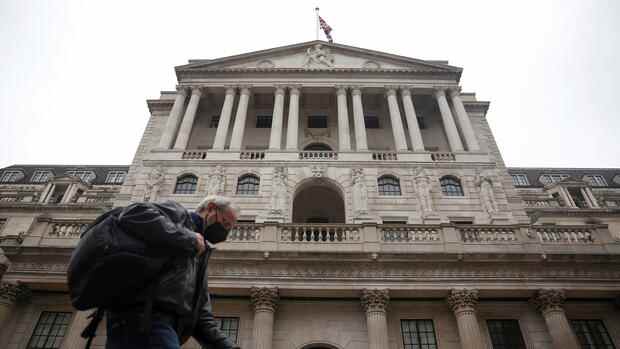The British central bank has raised interest rates for the third time since December.
(Photo: REUTERS)
London Despite the economic uncertainty caused by the Ukraine war, the Bank of England is continuing to hike interest rates. On Thursday, it raised the key interest rate by 0.25 percentage points to 0.75 percent. It was the third rate hike since December.
UK central bankers continue to see the fight against inflation as their top priority. The inflation rate was 5.5 percent in January – well above the long-term target of two percent.
The Bank of England had previously expected a peak of 7.25 percent in April. Now she said inflation could rise to eight percent next month and a few percentage points higher in the second half of the year.
The war in Ukraine has exacerbated price increases, the central bank said. Global supply chain issues and the outlook for the global economy have also continued to deteriorate. “The economy has experienced a number of major shocks recently,” read the minutes of the monetary policy meeting. “Russia’s invasion of Ukraine is another such shock.”
Top jobs of the day
Find the best jobs now and
be notified by email.
The next surge in inflation is expected in April, when the statutory energy price cap will be raised by 54 percent. A similarly high rise in energy prices is expected when the cap is next set in October. Then the annual energy bill for the average UK household could rise from £2,000 to more than £3,000 a year.
Further rate hikes are likely
Further rate hikes this year remain likely. “Further moderate tightening of monetary policy in the coming months could be appropriate,” the central bank said. But there are risks in both directions.
Much will depend on how badly the consequences of the Ukraine war hit the British economy. Most recently, economic output had grown surprisingly strongly by 0.8 percent in January. The economic damage caused by the omicron wave of the corona pandemic was less than expected.
Britain is also less dependent on Russian gas and oil than Germany, for example. By the end of the year, the government wants to completely stop oil imports from Russia. However, British households and businesses are being hit just as hard as the rest of Europe by the rise in world market prices for oil and gas.
The mood among companies is still good, and the labor market is robust, the Bank of England said. However, consumer sentiment has already deteriorated noticeably due to rising prices. That will slow down the economic recovery this year.
The employers’ association CBI warned that companies’ willingness to invest would also decrease as a result of the uncertainty in Ukraine and that it would have to be boosted with new tax breaks.
More: The US Federal Reserve is raising interest rates for the first time since 2018 – it’s the start of a risky mission.
